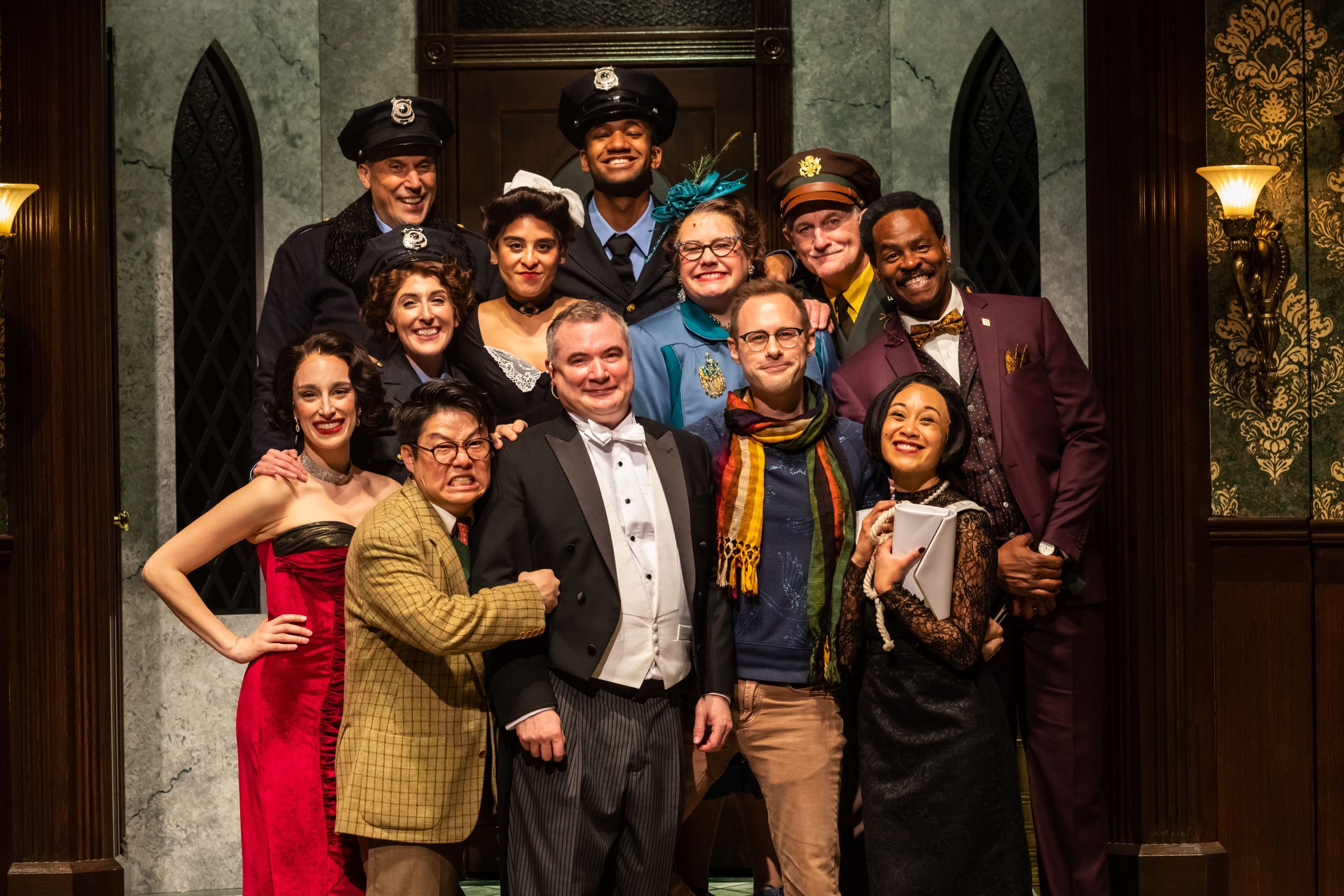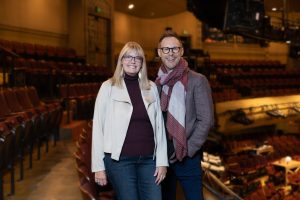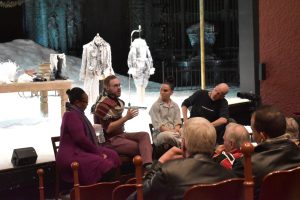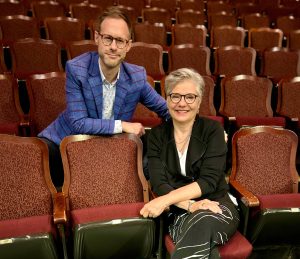
Benjamin Hanna and the cast of the IRT’s 2023 production of Clue – Courtesy of Zach Rosing. Used with permission.
On July 1, following Janet Allen’s retirement as artistic director of Indiana Repertory Theatre, Benjamin Hanna embarked on his first season as IRT’s Margot Lacy Eccles Artistic Director, following six years as the company’s Associate Artistic Director. Hanna holds a degree in theatre arts from the University of Minnesota Twin Cities. Prior to his role at IRT, he spent five years at Berkeley Repertory Theatre and directed shows at the Bay Area Children’s Theatre.
In his native Minnesota, Hanna served on the education staff of Penumbra Theatre Company and was an artistic associate at Children’s Theatre Company. He is the recipient of the prestigious Theatre Communications Group Leadership University Award funded by the Andrew W. Mellon Foundation and is a recent graduate of the Stanley K. Lacy Leadership Program—Class XLVI. At IRT he has directed “Clue,” “Fahrenheit 451,” “The Book Club Play,” “A Christmas Carol, and “We Are in a Play!” among others.
Recently I sat down with Hanna for a wide-ranging interview in the Danner Room at the IRT. Since then, however, I reached out to Managing Director Suzanne Sweeney, via email to ask her what she thought he would bring to the table. “Ben has a beautiful spirit that he brings to all his collaborations. He really leads with joy, which makes the work energizing and fun. He is a long-time leader in inclusion, diversity, equity and access, and has helped the IRT make great strides in that area over his tenure, with more work to come.” As far as the two of them working together she emphasized. “The process has been seamless so far! I just told our board that the reality is that we have been working so well together already that it feels like we have been doing this for years. This is really a sign of how strong the institution is to weather leadership transitions so successfully.”
Below is an edited transcript of my conversation with Hanna.

Benjamin Hanna – Courtesy of IRT. Used with permission.
How has the job been thus far?
There are the usual growing pains, but it has been joyful and exciting. Spending five years with Janet Allen in the institution means change comes with the speed of trust, because I have a lot of trust already. Some of the changes that could have been complicated are smooth.
What did you learn from her?
I learned how to be transparent about the decisions you are making and to listen deeply to both artists and administrators about how to best serve the community. I also learned and she said this all the time in meetings “You cannot consternate. You must make decisions. There is only so much time because of the scope and scale of the work we are doing.” She taught me that there is only so much time for you make the decision, so you must make it quickly and efficiently, check your gut, and then make up your mind. There is no wrong decision, but sometimes you do not know that until you have made the foible.
Do you also depend on your staff while making decisions?
Absolutely. Janet was also good at checking in with many different people, making sure that the perspectives at the table were as representative of as many folks in the community as possible. She would often own up to the moment when she decided without asking enough people saying, “I wish I could go back in time and ask these three folks in the community.” I witnessed Janet make a mistake and get up and get back at it. There was always the moment to contemplate why something happened and change the system to make sure it did not happen again. But that retard moment was pretty fast for her to say, “There’s more work to be done.”
What was your selection process like?
In full transparency, there were many other theatre search processes happening at the same time, so this was one option for theatre leadership. I knew that if this community did not choose me, I would be fine. I said to the board repeatedly during the search process, because they were so nervous, “Don’t run away now. We have done all this work now and we just want to make sure you are the right person. And I said ‘If I am not the right person then I should not have this job and that is all good. If we are not meant to be right now, I want to set up the next person for success just the way I would want someone to do for me.’
Why were you chosen?
What I was saying consistently about some of the changes and shifts we needed to make were common themes in the national thread of the candidates. For them it was “Wow, Ben has all this groundwork laid. Some of these ideas he has are being echoed from different perspectives. The changes he is offering are national changes that he already has finger on the pulse of.” And they spoke about the slow growth of change over my five years here. They witnessed the grace of asking for substantial change and knowing it can’t happen overnight and that we must find ways to fundraise for that change. We must find ways to bring our board, staff and patrons and our donors all along on our journey. If we all do not move in the same space at the same pace, then someone gets left behind, and they do not feel welcomed and do not feel a part of it. I think my history in the community partnered with the fact that I was making great art resulted in a positive outlook regarding my work.
Even though you are artistic director, don’t you require business acumen? Where does yours come from?
Two things. Mine came from growing up poor and managing money as a young person and into my college years and beyond working in small nonprofits with small amounts of money. Figuring out how to do a lot with little, like a part of my historical moment. IRT is one of the largest LORT (League of Resident Theatres) theaters where I have had a part in management of large-scale projects. So, I came here with a lot of knowledge but to manage uur artistic budget.
Do you consider yourself a good fund raiser? What do you like about it?
Yes. I think fundraising is just about relationships and storytelling. Those are both things that I love, building relationships and I love telling stories. I love to talk about how we can make stories that are resonant and relevant to our communities. People who have resources are always trying to connect to ways they can make the world a better and they are deciding, “How will I use my resources to make the world a better place. My job is to say this is one of many ways you can spend your dollar in making a better Indianapolis.

Suzanne Sweeney & Benjamin Hanna – Courtesy of IRT. Used with permission.
Are you inheriting a healthy organization?
I inherited an organization that has been on a particular path for a long while because Janet was the artistic director for 27 years. The organization has been Janet’s lens for all that time. However, she and I had a lot of overlap. There was a lot of programming that both Janet and I programmed and there were other things that she liked to program, and I liked to program.
Musicals were always the thing that Janet and I disagreed about. I passionately believe that there is not much more American than the musical and it has been so outside of the box of this institution. We have done them over the years, but it was not part of the regular seasons we produced. I am directing “Little Shop of Horrors” at the end of this season.
Aren’t musicals good for attracting audiences?
It is a great marketing thing. We did “Clue” last year and it was wildly successful financially. It also brought in people who we had not seen in the theatre for five years or who had not been here for a decade. That access point is a major reason regional theatres present one or two musicals a season.
Post- COVID, do audiences just want to be entertained?
We need to laugh now. Someone asked me recently “How will programming change under the Ben Hanna umbrella. What will that look like?” And I said “You will see more musicals and more comedies because there is something so powerful about laughing with one another in a room. After “Clue” you felt like you just had therapy, massage, gone for a swim, had a case of wine. One just felt energized. Janet asked me “Do you know how hard comedy is? Farce feels impossible when you begin to make it funny in a relatable and immediate way. I found it more challenging than most of the things I have directed.
Why are you just directing only one show?
I am a firm believer that an institution thrives when there are more diverse voices and lens guiding artistic processes. For me, I am a director but not a director first. I am a curator. So, I love to direct but I also like to feel that the role of the artistic director has changed over time. It used to be directors would become artistic directors and then would be about “Why doesn’t this person want to direct?” Janet and I did not feel that way. I will always do one and my associate artistic director, Ismael Lara Jr. will do one too. Ismael is a recent hire. A Mexican American, who grew up in Texas, is relocating from Chicago where he is just finishing his graduate degree at Northwestern.
How will IRT move forward with an eye towards inclusiveness and diversity?
You will not be surprised when I arrived here six years ago, there was a dramatic uptick in that shift. I grew up in an entirely white environment. I do not think I really knew a person of color until I went to college really. I went to the University of Minnesota. At U. of M. one of my professors was Lou Bellamy who was artistic director of Penumbra Theatre. That is where August Wilson wrote much of his Century Cycle. Lou invited me to join his staff after college. I was at a black theatre as a white identifying gay man. My exposure and the invitation from that community to be a collaborator allowed me the opportunity to learn about allyship, how to earn allyship and how to learn about community space that was multicultural and multigenerational. Finding the barriers to participation was part of the work and then figuring out the action plan to dismantle it.

Milicent Wrigth, Benjamin Hanna, Emma Rosenthal, and Rob Johansen during an Artist Talk for A Christmas Carol – Courtesy of IRT. Used with permission.
So, you had a lot do with casting BIPOCS in roles during the past six years at IRT?
Yes, I was basically the casting director. Janet and I did it together, casting and we curated the creative teams so when it came to any designer or actor we were always in collaboration.
How did you navigate maintaining quality as opposed to casting BIPOCS just for the sake of casting BIPOCS?
At any given time, it does not matter ethically or racially who they are if they do not have the skills to do the role. It does the person and the theatre a disservice to put them in the play, so our job was to make sure we were sourcing the right actors and challenging our casting directors in Chicago and New York we were working with. Locally to ask as many people as possible to come in for as many roles as we could think of them.
Does the perception that a “town and gown” mentality still exist when it comes to IRT casting local actors?
I still hear it sometimes. I will hear it less now that I am the artistic director. When Iwas the associate, sometimes people would reveal those things to me, and I would say “I do not believe that is true. I am in a lot of those casting conversations, and we are seeing a lot of local actors.?
Do you see a lot of local shows?
I do not see a lot of them, but I am very aware of the local talent pool. We have a local database of 180 actors that I keep up to date so when people send me their resumes and head shots. Ther are lots more people joining the union.
Do you foresee a time when there will be enough Equity theatres that actors will be able to make a living here?
No. Some will but a large pool of people, no. But there are a couple of local equity actors who like Ryan Artzberger who has done fifty-two shows here Rob and Jen Johansen, Constance Macy, Milicent Wright. When local actors ask me, “Should I join the union,” my answer is always “I can’t tell you whether to join the union first of all and what I would ask you is ‘are you willing to work out of town?’ and if you are not willing to work out of town and only work in town than you really have to contemplate that question. Because there are only so many because there is this kind of fence this dividing line that if you are Equity, you either have to work over here or you are not equity and you can work over here.
Describe your aesthetic,
Community focused. Process driven. With an Equity lens. And sustainability is at the heart of that because we are one of the few theatres that is fiscally stable. You must think of sustainability every step of the way to stay sustainable without needing any kind of Federal subsidy. We need to make sure that what we are doing is actually…there must always be enough populist material so that we are always of service and access to our community. You cannot jump over the hurdles of parking downtown, the perception of it being unsafe, if you live in a suburb you must travel for 20 or 30 minutes. You must figure out childcare, you must figure out what to do with grandma, you must figure out how to get out of work at a certain time. If all those things, plus the play title is something that is completely esoteric and nothing of your world, it is hard to sell. Because at the end of all those things it is all about accessibility. “I can see Clue. I have played that board game.” That is your entry point. That is your point to get into the theatre and laugh, have a drink, and gather. And now, the next time you see a play even if its recognizable to you can go because “I had a really great time, I am really interested in that topic or I want to see that great artist.”

Ben Hanna & Janet Allen – Courtesy of IRT. Used with permission.
How can people help you?
How do you help this next chapter of IRT? The important thing is ask someone if they have been to the theatre and if they haven’t, bring them. Buy them a ticket, take them to dinner and have them be in a seat next to you. And if everyone who comes here and loves it and brings one or two people, suddenly you have triple your audience and only half of those people stick around, only half of those people really love it. I am spending a lot of time this year inviting people to the theatre to see plays with me because part of this is just introducing people to your home, right? When you ask someone to your home, you make dinner for them, so we serve up all sorts of beautiful food here, like beautiful art for people. Part of it is getting you in the door and experiencing it and knowing you are welcome.
Do you agree with the saying “A rising tide lifts all boats?” as it pertains to other arts organizations?
I am not in competition with anyone because I think if someone sees a piece of art somewhere else it means that is more than likely that they will see a piece of art here. Yes, we are the largest theatre. Someone said, “You are the greatest theatre.” No, sometimes we do a great piece of art. I do not know what this idea of the greatest theatre is. We are the largest theatre, and we do excellent work. I believe in the art we make but I also believe in the art that American Lives Theatre does. They are doing incredible work and so are the Fonseca, Phoenix and Catalyst. There are so many groups doing exceptional work.
What are your short-term goals?
I want to get through this transition. People think of this as Janet Allen’s Indiana Repertory Theatre because she was here for so long, so the transition has been a big one. I want to make sure I am bringing people along, so my short-term goal is to make sure I comfort people and challenge people in equal dose. I have been in this space learning why things are why they are, so there will be a lot of familiarity and comfort so that should be the transition should be smooth.
What is Ben Hanna’s IRT going to look like?
I hope that you come in and that it is like when you go to an international market in the city, and you feel welcomed like you want to be welcomed. That people see folks who look like them and speak the same language they speak and the neighborhood they live in represented in it. I hope that there is music playing and I hope that it is multi-generational and that no one who is over fifty feels like they cannot be in the audience because of a really hip new play. I hope no young person feels like they cannot come to see a Chekov piece. I hope there is a way everyone can have access to it.
We are doing a lot of this work now, but I want there to be partnerships with nonprofit organizations that are doing the work in our city that are related to storytelling that we are putting on our stage. For instance, when we do “Folks at Home” which is a new play about an interracial gay couple, a comedy, we are partnering with IYG (Indiana Youth Group) to talk about how we can support lifting their mission and their vision. How do we invite their community to see this play, not just because we want their ticket sale, but we want their community to see themselves reflected on a major regional stage? We just need to build those partnerships out.
What is your message to our community?
The stories on our stage will grow your empathy and you cannot buy that experience anywhere else. Live theatre changes your heart and there is nothing like that magic. You must experience it to know what it is. I want everyone to know that they are welcome.
For tickets and information about the Indiana Repertory Theatre 2023-2024 Season visit irtlive.com.





